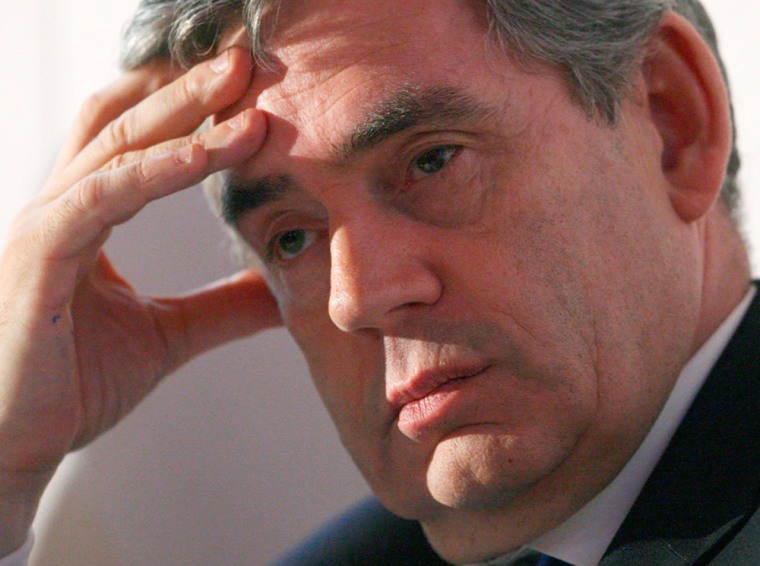Gordon Brown waited for more than a decade to be prime minister. After a dismal first year on the job, many wonder how long he'll last.
The once-admired Treasury chief has been routed in municipal elections, seen his opinion poll ratings tumble and could very well send his Labour Party back to opposition.
He has offered mixed signals over withdrawing troops from Iraq, risked offending allies in the United States and Europe and appeared more intent on fighting poverty overseas than at home.
As he marks a year in office Friday, polls give his party its lowest rating in decades. Few predict he will win a national election expected in 2010, and critics wonder whether he will even lead his party into the election.
"Gordon Brown's first year has brought the Labour Party to the edge of extinction," Labour legislator John McDonnell told The Associated Press.
Antidote to Blair
When Tony Blair departed after a decade in power last June, Brown aimed to cast himself as an antidote to his charismatic predecessor.
"Not flash, just Gordon," a billboard poster for Brown proclaimed, seeking to define him as serious and statesmanlike.
Brown proved true to that image in his first weeks. He projected an air of calm during bungled terrorist attacks in London and Glasgow, and floods that left 13 dead. Brown later called the period his "baptism of fire and water."
Buoyed by his early successes, Brown taunted the main opposition Conservative Party by inviting their iconic and fiercely partisan former leader Margaret Thatcher for tea at Downing Street — the one-time Iron Chancellor greeting the Iron Lady.
Brown's supporters noisily predicted an autumn election, and his party even began spending in preparation.
But as backers fanned rumors of an early vote, Brown procrastinated.
Then, as election chatter hit fever pitch during political party conferences, Brown backed down — just as his opinion poll ratings faltered. Once he ducked the fight, his poll numbers went into freefall.
The honeymoon is over
Brown's brief honeymoon had ended abruptly. He has yet to recover — in large part because a series of bungled crises that have dented his reputation for competence.
The global credit crunch began to bite, plunging British mortgage lender Northern Rock to the brink of collapse and triggering the first run on a British bank since 1866. Lines of anxious investors snaked down streets as they waited to withdraw savings. He eventually nationalized the ailing bank — but confidence in the government was badly bruised.
As Britain's economy slowed, and fuel and food prices skyrocketed, Brown blundered again, scrapping the lowest tax rate — effectively raising income taxes on the nation's poorest. But he retreated quickly and pledged 2.7 billion pounds ($5.3 billion) to compensate low income workers.
The reversal on tax was matched by confusion over troops withdrawals from Iraq.
Brown cut Britain's troop strength from 7,500 to 4,000 — and then announced a further round of cutbacks. Now, all withdrawals have been suspended, and he has refused to confirm whether British forces will remain based around the oil-rich southern city of Basra beyond 2008.
The lack of decisiveness caused friction with President Bush — as did Brown's prickly demeanor during their first meeting at Camp David. Brown insisted on a formal suit, as Bush donned slacks and a smile. Bush's gift of a monogrammed combat jacket went unworn.
Lofty ambitions amid the catcalls
And while Brown's lofty ambitions to deliver better education and health care to the world's poor have brought eye-catching endorsements from George Clooney and Angelina Jolie — they have won him few admirers at home, where people complain loudly about the rising costs of bread and gas.
Despite his woes, Brown may yet recover. Contentious legislation on terror laws and stem cell research was deftly guided through Parliament. What is billed as a bold economic plan is being drafted.
Sunder Katwala, head of London's leftist Fabian Society think tank, insists Brown's troubles are not terminal.
He claims they don't even match ex-U.S. President Bill Clinton's slump in 1994, when the Democratic Party was routed in midterm elections.
"Brown's position isn't as grave as Bill Clinton's when he looked dead in water," said Katwala. "There's a lot of politics left in this yet, but it's up to Brown to get back to making the political weather."
